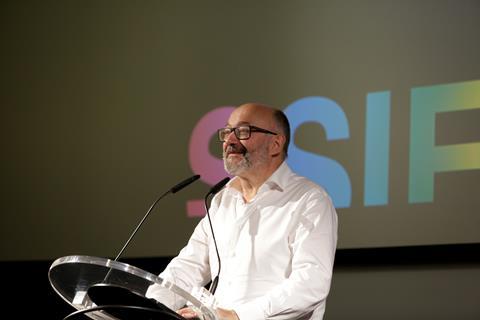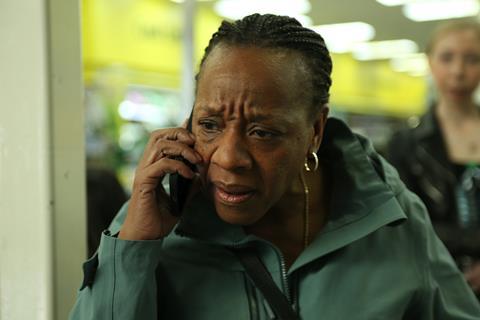
José Luis Rebordinos, festival director of the San Sebastian International Film Festival (SIFF), the event’s role as a key port of call for the Spanish and international industry during the busy second half of the year.
As the festival prepares to open tonight, Friday September 20, with the world premiere of Audrey Diwan’s Emmanuelle, Rebordinos talks to Screen about SIFF’s support of Spanish cinema and rising filmmakers from around the world, why the festival is well supported by its public funding partners and what the honorary Donostia award for Pedro Almodóvar means to him personally.
What themes have you perceived in the films of this year’s official selection?
We have fewer first features than usual and a substantial number of big names. There are also quite a lot of genre films, including Emmanuelle, Pedro Martín-Calero’s first film The Wailing, that uses horror with a really rich subtext and Kiyoshi Kurosawa’s Serpent’s Path, a thriller that plays with B-movie conventions.
There is also a strong presence of social cinema in Mike Leigh’s Hard Truths, Costa Gavras’ Last Breath and Laura Carreira’s On Falling, a film about the people who work hard but still don’t manage to make ends meet. Her film reminds me of Ken Loach’s early films.

Albert Serra’s bullfighting non-fiction feature Afternoons Of Solitude might also trigger some discussion, whiile In Her Place by Maite Alberdi is Maite’a first fiction feature film.
Is supporting new talent still one of the festival’s key policies?
Indeed, and it’s great to see some of these talents back. John Crawley was selected in New Directors in 2003 with his first feature, Intermission, and now we are delighted to welcome him in the official selection with the closing film, We Live In Time. Without a doubt, one of the films of the year. And Florence Pugh, who stars in the film alongside Andrew Garfield, was here with Lady Macbeth , which was selected in competition in 2016 and was the film that launched her.
What is the total budget of this year’s festival and how does that funding break down?
This year it’s over €10m. [Public] support increases with the cost of living. Direct funding by the four institutions supporting the festival (the Spanish, Basque, and the region of Gipuzkoa governments as well as the local government of the city of San Sebastian) equates to 55-56 % of our budget.
The festival gets the rest from the box office and private partners.
I have total trust in the sustained support of public funding. The four institutions that fund the festival are invested in culture and even in the event of changes in power, all parties have shown their commitment with the festival over the years. They see San Sebastian as a key cultural and industrial event.
The third annual Creative Investors’ Conference is taking place during the festival. It was initially set up with European funding. How have you managed to secure its continuity?
The key role of the Conference is to debate and analyse the trends and challenges of the industry and to help the Spanish industry to network with international players and investors. In terms of financing, both the Conference and the Spanish Screenings, that we do together with the Malaga Film Festival, have worked so well that the Spanish government decided to keep on supporting it through the film body, ICAA (Institute of Cinematography and Audiovisual Arts) and ICEX Spain Trade & Investment.
The Conference budget is around €500,000. The aid is linked to the annual funding to the festival so it will be renewed. Continuity is granted.
The industry activities of the festival have grown significantly. Do you have any plans to introduce a film market?
We love welcoming more key players come to San Sebastian but we don’t have plans to have a film market. We don’t have the necessary infrastructure. Hotels are running at full capacity during the festival as it is. We will give more and more relevance to industry activities, but they don’t necessarily need to be bigger or with more attendees than we currently have.
How did you secure the world premiere of Emmanuelle?
We are very happy to be opening with Emmanuelle, an erotic film that is also very political. It is Emmanuelle, post MeToo, [a film] that turns the original on its head and is told from the perspective of Audrey Diwan, not from the heterosexual male gaze.
When we saw it we asked if they would like to be in competition and open San Sebastian. Diwan loved the idea and [sales agent] Goodfellas too, because the film will be released in France soon afterwards [on September 25]. They also were very pleased with how last year’s opening film, Miyazaki’s The Boy And The Heron, worked for them.
What does presenting Pedro Almodóvar with the honorary Donostia award, fresh from his Golden Lion win in Venice for The Room Next Door, mean to you?
The Donostia award was long overdue. We love Pedro. It will be magical. I remember watching Pepi, Luci, Bom at the festival when I was a young lad and had nothing to do with cinema.A memory I treasure is seeing him and his team having a drink by the Victoria Eugenia theatre. In our archive we keep a serviette signed by Almodóvar authorising the screening of Pepi, Luci, Bom.
He has opened a lot of doors [for Spanish filmmakers around the world] and I admire his talent and the fact he is a filmmaker with such a strong personality.























No comments yet